In this article we will be looking at the the new Tribute mechanic with help from our special guest — Flame-Wreathed Phoenix.
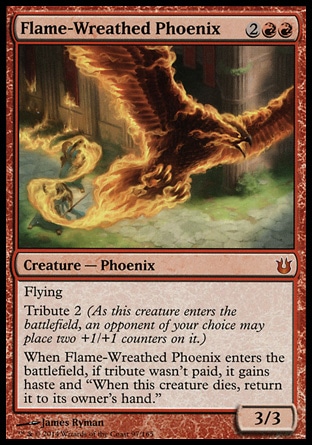
Oracle Text:
Creature — Phoenix 3/3
Flying
Tribute 2 (As this creature enters the battlefield, an opponent of your choice may put two +1/+1 counters on it.)
When Flame-Wreathed Phoenix enters the battlefield, if tribute wasn’t paid, it gains haste and "When this creature dies, return it to its owner’s hand."
Full rules text for Tribute is:
702.103a Tribute is a static ability that functions as the creature with tribute is entering the battlefield. “Tribute N” means “As this creature enters the battlefield, choose an opponent. That player may have this creature enter the battlefield with an additional N +1/+1 counters on it.”
702.103b Objects with tribute have triggered abilities that check “if tribute wasn’t paid.” This condition is true if the opponent chosen as a result of the tribute ability didn’t have the creature enter the battlefield with +1/+1 counters as specified by the creature’s tribute ability.
Simply put, the chosen opponent can either agree to the creature entering the battlefield with additional +1/+1 counters or fulfil the trigger condition. I believe the first option, entering the battlefield with additional counters is very clear, the difficulty lies with the second option, the conditional trigger.
The main thing to remember is that all triggers associated with Tribute are conditional (intervening if clauses). This means that if tribute is not paid, the condition for the triggered ability is met and the triggered ability will trigger.
That is why your opponent can “pay Tribute” — allow your creature enter the battlefield with additional counters. If we assume that the ability successfully triggers and resolves, the opponent has to choose between a big creature and something worse:
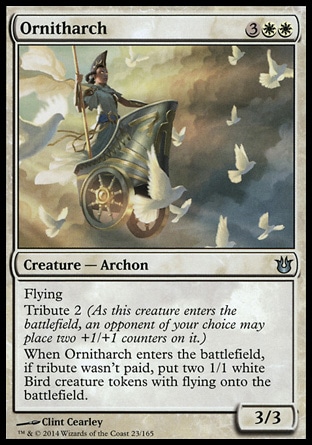
An opponent must choose between a 5/5 flyer or a 3/3 & two 1/1’s with flying.
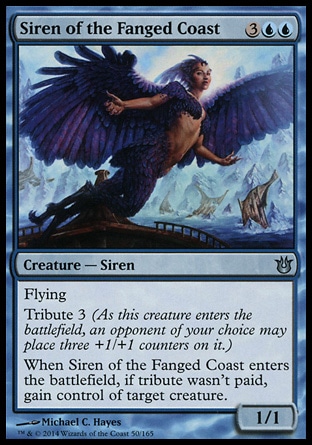
An opponent must choose between a 4/4 flyer or a 1/1 flyer with the ability “I’ll take control of your creature until our game is finished, thank you very much”
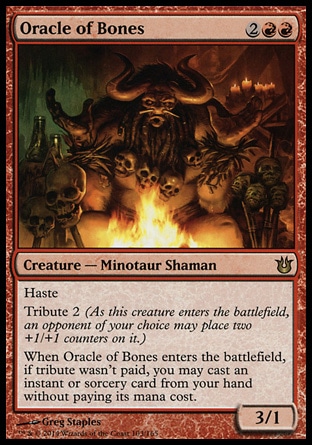
A 5/3 with haste or a 3/1 with haste which allows you to cast an instant or sorcery for free?
To avoid confusion I think it’s important to look at the timing rules surrounding tribute. It happens as the creature is entering the battlefield. Not when the creature is cast (and is on the stack) and not after the creature has entered the battlefield, but rather the period in between these two events. If you know how Clone works, the timing rules with regards to the choice are exactly the same. Clone leaves the stack as one creature and enters the battlefield as a copy of the creature the player has chosen. The choice, of what the creature will become, is made after the creature has left the stack and before it arrives on the battlefield. Put simply, time stretches out to allow you to make a choice.
For the creature with Tribute it doesn’t matter how it appeared on the battlefield and where it was before. Of course, the easiest way to get a creature is to cast it. So, because choice for Tribute is made after the creature spell has started resolving, your opponent cannot respond to the choice or counter spell it. We have only one opponent in a duel. If they tell you whether they want to pay Tribute or not, it means that they allowed the creature to appear on the battlefield.
So what happens to Tribute creatures that arrived on the battlefield without being cast? For creatures with Tribute it doesn’t matter how they arrived on the battlefield or where they were before.
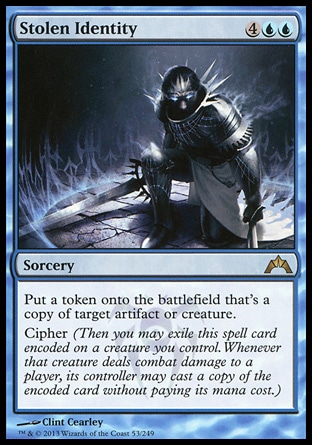
If Stolen Identity targets a creature with Tribute, as the token enters the battlefield the opponent must decide whether to pay tribute or not. Please note that neither the counters nor the abilities gained are copied by Stolen Identity.
Whip of Erebos’ activated ability puts a creature card from the graveyard onto the battlefield. If this creature has Tribute, the ability functions as if the creature has been cast.
Show and Tell's effect allows us to put a creature from our hand onto the battlefield, as the creature is put onto the battlefield the opponent must decide whether to pay Tribute or not.
Tribute is a static ability, so it never goes on the stack — that means no one can respond to it and it can’t be countered. Furthermore, when a creature enters the battlefield, a spell or an ability are resolving, and thus no player has priority at that moment and no one can do anything.
Tribute doesn’t target your opponent, therefore Leyline of Sanctity won’t help them. In a multiplayer game you can choose any opponent. However, your second Head in Two-Headed Giant is not an opponent!
If the selected opponent chooses to pay Tribute, the creature enters the battlefield with additional +1/+1 counters. At no point in the game is there a moment when the creature is on the battlefield without counters. However, as far as the rules are concerned these counters are considered to be “placed on a creature” and thus are affected by Doubling Season and Corpsejack Menace's replacement effects.
If the chosen opponent refuses to pay Tribute, as soon as the creature enters the battlefield, the condition is met and the triggered ability part of Tribute triggers. After SBA have been check, all abilities that triggered are put on the stack and it is that this point the active player gets priority (and is able to cast instants or activate abilities).
Triggered abilities on the stack, exist independently from the object (in the case of Tribute the creature) that created them on are not concerned about what happens to the creature. Even if the creature leaves the battlefield before the trigger resolves, it still resolves. This can be prevented by a sudden end of turn effects like Time Stop, being countered by using spells like Disallow or by fizzling when all of its targets become illegal. If none of the above happen then the triggered ability resolves and the player who controls the triggered ability, gains it effect.
Now, that you have familiarised yourselves with the Tribute mechanic, lets take a closer look at our star guest Flame-Wreathed Phoenix.
The Phoenix has Tribute 2. This means that when it enters the battlefield, chosen opponent can decide between the Phoenix entering the battlefield with two +1/+1 counters or fulfiling a triggered condition of the conditional triggered ability. Or put simply, the opponent can either give the player a 5/5 flyer or a Phoenix that returns to its owners hand when it dies, to be cast again and again and again (assuming that Hushwing Gryff is not in play).
It's worth noting that Hushwing Gryff only affects Enter the Battlefield triggers (like the one granted to the Phoenix if the opponent chooses not to pay Tribute). Not the replacement effect which is generated by the static ability. If the triggered ability doesn’t resolve (because of something like Stifle), we get a 3/3 with flying without any additional abilities.
If Phoenix dies before its EtB-trigger resolves, it stays in the graveyard, because it doesn’t have the ability which allows it to return to its owner’s hand yet.
If the EtB-trigger resolves, Phoenix gains two abilities. One of them is static — Haste — which allows it to attack on the same turn it entered the battlefield. The second is a triggered ability: “When this creature dies, return it to its owner's hand”.
- When is used to template a triggered ability
- this creature dies — is the trigger event.
- “Dies” is a term which has the following meaning: “if a creature goes from the battlefield to the graveyard”. The reason why the creature moved from the battlefield to the graveyard doesn’t matter to the trigger ability. In fact, the ability doesn't care if the creature was destroyed due to lethal damage or spells like (Asphyxiate), it could have been sacrificed ( Mogis, God of Slaughter), or it could have gone into the graveyard due to its toughness being 0 ( Warped Physique).
- Phoenix must have the ability on the battlefield in order for it to trigger. If Phoenix goes into the graveyard due to fused Turn/Burn resolving, it won’t have the ability, so nothing will trigger.
- If Phoenix loses its abilities when it gets hits the graveyard due to the presence of a Yixlid Jailer, its ability still triggers.
- It doesn’t matter whether Flame-Wreathed Phonix is a creature or not, only the existence of the ability is important.
- If Phoenix goes to some other zone from the battlefield because of spells like Excoriate or Leyline of the Void is on the battlefield, its ability doesn't trigger because the trigger event is never fulfilled.
- return it to its owner's hand is the effect. Triggered abilities don’t produce their effect momentarily. First they have to trigger and go to the stack and then resolve.
- Whatever happens to the Phoenix in the graveyard doesn’t stop the the trigger working and it still returns the Phoenix to its owner’s hand. E.g., if Clone entered the battlefield as a copy of Flamed-Wreathed Phoenix and your opponent chose not to pay Tribute (so Clone gets haste and the triggered ability), when Clone dies, it's condition will be met and when it is resolves, Clone returns to its owner’s hand.
- If Phoenix is a token (as a result of Fated Infatuation), then goes to the graveyard, it ceases to exist as State Based Actions are performed.
- If Phoenix changes zones before the trigger resolves (for example, your cunning opponent stole it with Fated Return), then the trigger will be unable to find Phoenix and return it to your hand.
- If Phoenix has moved through several zones and finished in the graveyard, the trigger will be unable to see it because as far as rules are concerned it's a completely different Phoenix.
- No matter who controls Phoenix on the battlefield, the trigger returns it to its owner’s hand. Remember: a card cannot enter the graveyard or the hand of any player other than that of its owner.
Bonus: Two for One Sale on Now!
Translated by Witas Spasovski

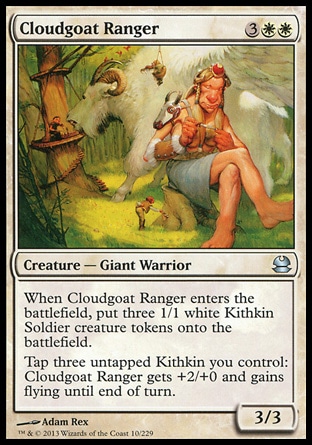
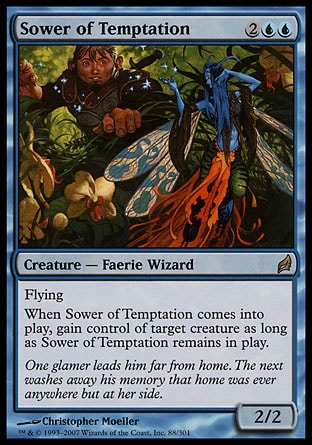
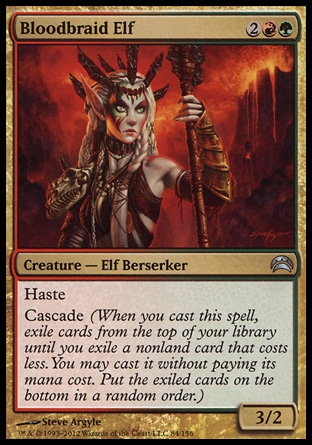
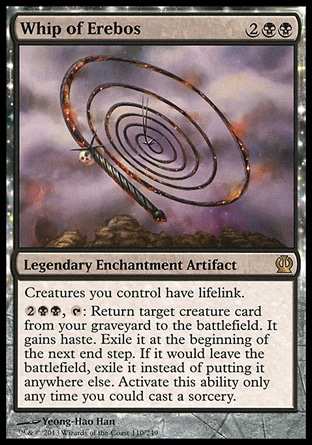
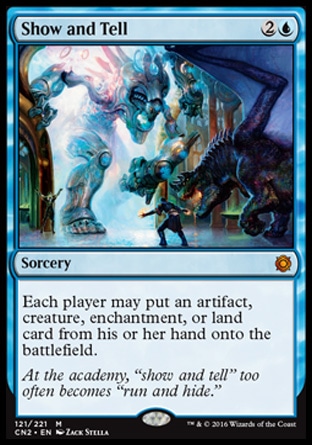
A 5/3 with haste or a 3/1 with haste which allows you to cast an instant or sorcery for free?